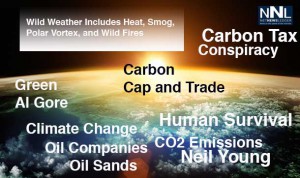 OTTAWA – OPINION – The Trudeau government’s plan to ensure that there is a significant price on carbon dioxide emissions across Canada is irrational. It will have no impact on climate, yet will cost billions of dollars that should be dedicated to health care, education, rebuilding our crumbling infrastructure and other immediate concerns.
OTTAWA – OPINION – The Trudeau government’s plan to ensure that there is a significant price on carbon dioxide emissions across Canada is irrational. It will have no impact on climate, yet will cost billions of dollars that should be dedicated to health care, education, rebuilding our crumbling infrastructure and other immediate concerns.
Contrary to Green Party leader Elizabeth May’s assertion that the Liberal’s decision to retain the Harper government’s emission reduction goals “is nothing short of a disaster for the climate,” there is nothing Canada can do that would significantly affect climate. We are mere bit players on the world stage.
Saskatchewan Premier Brad Wall laid it out clearly in Sunday’s interview with Evan Solomon on CTV’s Question Period. “We’re 1.6% of global emissions,” said Wall. “If we meet the targets or if we exceed the targets, it will not impact the world’s climate one iota.”
Activists argue that it is still worth the cost since we are setting an example for developing nations, the source of most of the world’s emissions, to follow. But poorer countries have indicated that they have no intention of following our lead.
For example, on July 18, President Rodrigo Duterte of the Philippines said about the Paris climate agreement, “You are trying to stymie [our growth] with an agreement… That’s stupid. I will not honor that.”
Duterte can say this with a clear conscience. The United Framework Convention on Climate Change, the foundation of the Paris Agreement, gives an out clause for developing nations. The treaty states, “Economic and social development and poverty eradication are the first and overriding priorities of the developing country Parties.” Climate change be damned.
Environment Minister Catherine McKenna tells us that catastrophe awaits if we do not change our ways. Addressing the June 4 Ottawa West climate change town hall, the minister warned, “If we don’t set ourselves in a much better trajectory, we’re going to have irreparable changes… these are going to be changes that are going to be so dramatic that the impacts on humans, on animals, on biodiversity is going to be such that we won’t be able to deal properly with the future.”
No one, not even the world’s leading climate experts, know this. The reports of the Nongovernmental International Panel on Climate Change (NIPCC) cite hundreds of references published in leading science journals that show that today’s climate is not unusual, and evidence for future climate calamity is weak.
Even the UN Intergovernmental Panel on Climate Change admits that surface temperature, averaged over the land and ocean, increased only about 0.85 degrees Celsius between 1880 to 2012 despite a supposed 40% rise in atmospheric CO2 content. And a significant portion of the warming is part of the natural climate cycle coming out of the Little Ice Age. So, our contribution to the modest temperature rise that has occurred in those 132 years is something less 0.85 degrees, a far cry from McKenna’s excited forecast.
Given that there has been no general increase in extreme weather or the rate of sea level rise, the only rationale for the government’s actions would be the possibility of dangerous climate change in the future.
To develop sensible public policy in this case, we need vast amounts of weather and climate data. This is required to build the computer models on which climate concerns are based and then to provide the starting conditions for model-generated forecasts to be performed. We would then need to determine if these changes are likely to be dangerous, and if they are, how much of it we are causing.
Former University of Winnipeg professor and historical climatologist Dr. Tim Ball says that the collection and interpretation of data needed to fulfill these requirements has only just begun. He explains that there are relatively few weather stations of adequate length or reliability on which to base model forecasts of future climate. “McKenna’s worries therefore have absolutely no credibility in the real world,” Ball concludes.
Ball estimates that, between the surface and atmosphere, there is data for only about 10% of the total atmosphere. He concludes, “any discussion about the outputs of climate models is irrelevant. The models cannot work because the simple truth is that the data, the basic building blocks of the models, are completely inadequate. Yet, it is the model outputs that are being used as the foundation for Canada’s environmental policy decisions.”
The UN’s My World global survey shows that Canada’s government is out of touch with average people on climate change. After 9.7 million people from 194 countries have been polled, “action taken on climate change” rates dead last out of the 16 suggested priorities for the UN.
For most of the world, and especially those in developing nations, the message is clear: in comparison with access to reliable energy, better healthcare, government honesty, a good education, etc., climate change is not important.
Its time for governments to stop wasting our money trying to stop the climate from changing. We have real problems to solve.
_____________________________________________________
Tom Harris is Executive Director of the Ottawa-based International Climate Science Coalition.






